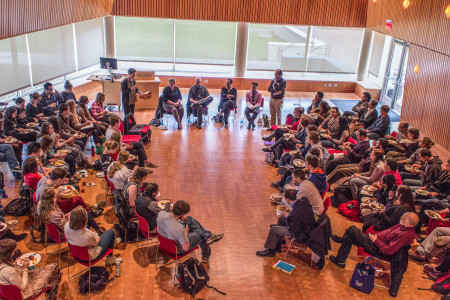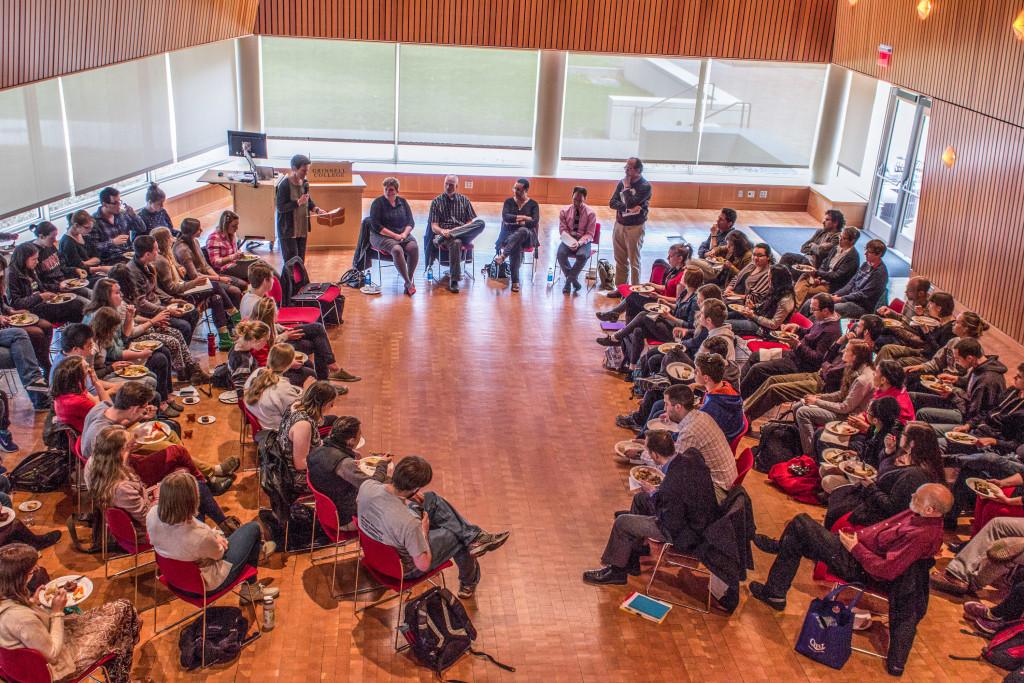On Tuesday, April 21, the Religious Diversity Dialogue Group (RDDG) and the Center for Religion, Spirituality and Social Justice hosted “In/Tolerance: Religious Expression in the Classroom,” a presentation featuring four professors who discussed the role of religion in academia. The talk was held in JRC 101.
The Religious Diversity Dialogue Group (RDDG) led by Dean of Religious Life Deanna Shorb and Associate Chaplain and Rabbi Rob Cabelli worked together to organize the discussion. The group facilitates conversations amongst students about religion and spirituality on campus. Earlier in the year, the group hosted a panel of seven students who gave a similar presentation about religiosity at Grinnell, which Cabelli said was an inspiration for this panel.
“One of the things percolating [in the group] was concern expressed about the freedom or lack of freedom to speak about students’ own religious experience, background and beliefs that they might perceive within the classroom setting, as well as the way students perceive that freedom in nonacademic settings with other classmates,” Cabelli said.

Photo by Sarah Ruiz.
Following the student panel, group members “really wanted to hear what faculty had to say about this phenomenon,” Cabelli explained. Subsequently, students in the RDDG compiled a list of faculty members they would be interested in hearing from. Afterwards, Cabelli and Shorb worked to compile a list of panelists from different departments on campus.
The four panelists featured were Professors Carrie Shanafelt, English, Katya Gibel Mevorach, Anthropology and American Studies, Caleb Elfenbein, History and Religious Studies and Benjamin DeRidder, Biology.
At the talk, the guiding discussion questions posed to the faculty prior to the presentation outlined how professors should respond in class when students bring a perspective informed by their own religious experiences and how their own religious backgrounds might affect the way they conduct the classroom.
One topic discussed was the misperception by secular persons of religiosity as synonymous with ignorance. Shanafelt said that when she entered graduate school, she was advised not to disclose her religious background because people would assume she was “less capable academically.”
“It’s a false choice that is exaggerated by players on both sides,” Shanafelt said of the perceived polarity between religiosity and secular, academic knowledge. “Each tradition can borrow from the other.”
Another common thread throughout the presentation was that, in the panelists’ teaching experience, religion rarely ever enters the Grinnell classroom. Elfenbein expressed a desire for Grinnellians to be more comfortable bringing their religious backgrounds to the academic table.
“There’s tremendous irony here, because I am so clearly open to sharing from one’s own religious perspective, but it almost never happens. The assumptions of a secular classroom really prevent students from engaging with intimate questions of religion,” Elfenbein said, noting that in his five years in the Religious Studies Department at Grinnell, there have only been two instances in which students spoke from “an explicitly religious perspective.”
Cabelli echoed these ideas about tolerance being preached but poorly implemented, which he attributed to a fear that students have of asking questions about each other’s religious experiences and admitting that there are things students might not understand about certain aspects of someone else’s religion.
“Many students are reporting that expectations of how we might communicate with each other expresses the notion that we must tolerate and even accept each other, but we don’t actually know what it is that we are trying to tolerate, accept or respect. We don’t necessarily feel free to engage without perhaps stepping into a minefield,” he said.
DeRidder explained that he felt it was important to have spaces for conversations about the relationship between science and faith. For him, one of those spaces is his office hours, where students have discussed how their own religious experience informs their experience engaging with science. DeRidder mentioned that he has also struggled to reconcile his own religious background with the body of scientific knowledge he teaches.
Each panelist also expressed the desire to create more open dialogues about religiosity on campus for the purpose of tolerance and equality, a view shared by those in attendance.
“Grinnell places a lot of emphasis on tolerance and equality,” said Gibel Mevorach. “I bring a very secular sense of how we should or should not treat one another.”



















































